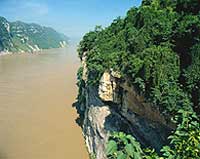 China has mapped out an ambitious program to clean up the pollution-plagued Yangtze River which, if successful, is expected to improve water quality for two-fifths of the nation's inhabitants by 2010.
China has mapped out an ambitious program to clean up the pollution-plagued Yangtze River which, if successful, is expected to improve water quality for two-fifths of the nation's inhabitants by 2010.
According to the program, water pollution in the Yangtze River area will be remarkably reduced within eight years, while most of the water sources for drinking will be greatly improved.
The program, approved by a team of experts at a meeting in Beijing Sunday, is the first time 16 provincial administrations along the waterway have united in a clean-up campaign.
The administrations have worked on their own plans to tackle such water pollution since the 1980s. The individual campaigns, sometimes conflicting and regionally biased, often led to dissent and conflict among different provinces, undermining the water clean-up campaign as a whole.
This time, the plan is more clearly designed, officials said. It builds on a comprehensive survey of the drainage disposal ability and wastewater discharge in different sections along the river.
The plan, for the first time, divides the waterway into four major sub-areas - the protection zone, buffer zone, exploitation zone and reserve zone - in terms of major functions of local water resources.
In addition, the exploitation zone is also further divided according to different functions for usage, where water resources are used respectively for daily life, industry, irrigation, aquatic cultivation and sightseeing.
Each area can be equipped with different measures of anti-pollutions, requirements on exploration of water resources and water quality monitoring.
The river can, therefore, be explored for its economic potential without being at the expense of water resource contamination.
At the meeting, experts said the program covers the largest drainage area, involves the most advanced technologies and, therefore, will be most effectively implemented.
The Yangtze River, the third largest river in the world and the longest in China, has long been polluted by industrial and domestic waste.
The overloaded human activities on the waterway have led to growing soil erosion, making it vulnerable to floods.
Economic toll is on the rise. One prime example was in 1998 when the river generated one of the worst flood disasters in the nation, involving 160 billion yuan (US$19.3 billion) in economic losses.
Experts have warned the growing pollution and water-related disasters may put a dent on economic growth in such business epicenters as Shanghai, sitting right at the estuary of the Yangtze River.
Ning Yuan, director of the Water Resources and Hydropower Designing Institute under the Ministry of Water Resources, said the program is the first of its kind to give a general outlook for protecting water resources within the Yangtze River drainage area as a whole.
The program suggests further efforts should be made in the fields of soil and water conservation and river channel improvement, as well as pollution monitoring and control.
Liu Changming, a member of the Chinese Academy of Sciences, said, to ensure sound water quality of the Yangtze River is of urgent importance, as the "south-to-north" water diversion project and water retaining project at the Three Gorges will soon be launched.
However, experts said the public should be educated about pollution and the dangers to the Yangtze River.
One suggestion has been to set up a "Yangtze River Day" in October, in what would be an annual event for people to relate pollution on the river with how it affects their lives in China.
(China Daily February 25, 2002)
